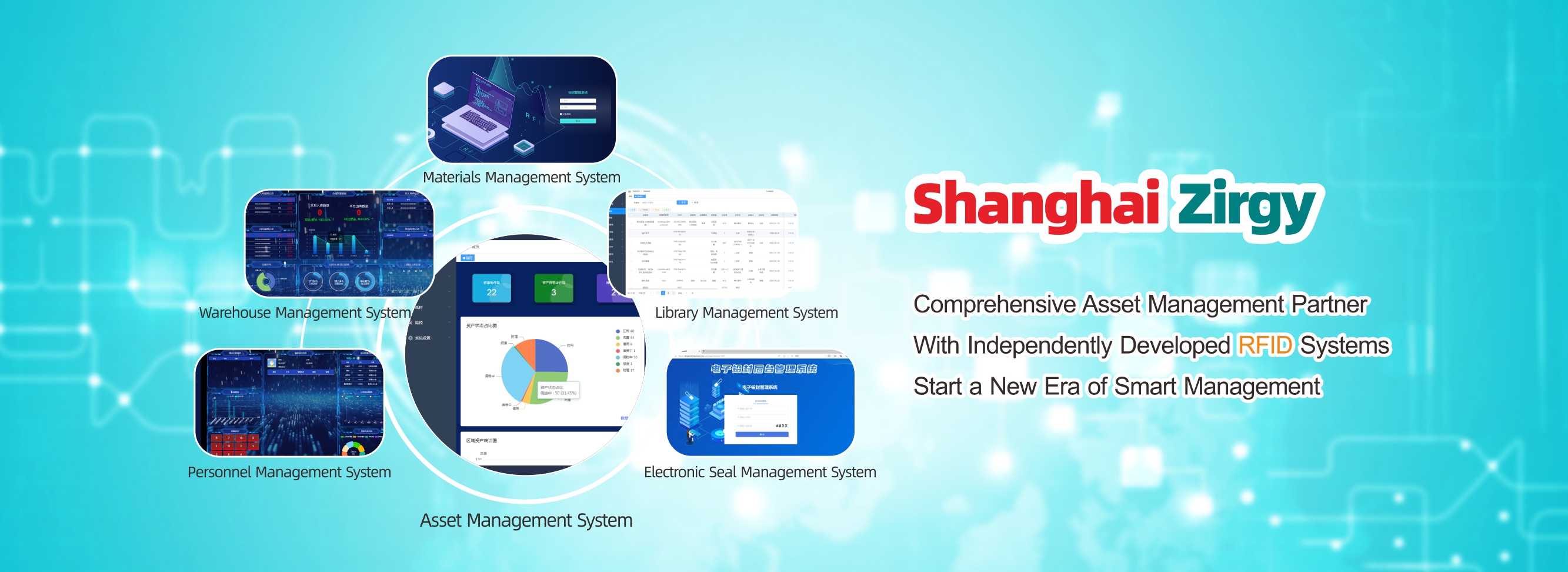- Asset management system
- Warehousing management system
- Anti-counterfeiting and traceability system
- Library management system
- Digital picking system
- Materials management system
- Intelligent patrol system
- Home-school communication management system
- Personnel positioning system
- Electronic lead-seal management system
- Clothing warehousing system
- Epidemic prevention and control management system
- Electric bicycle anti-theft system
About Zirgy
[+]

export@shzjsmart.cn

Address
3F, Building 1, 875 Qiuxing Road, Pudong New District, Shanghai
Introduction of Zirgy RFID Solution
Radio Frequency Identification (RFID) technology, as a contactless automatic identification technology, has been widely applied in various industries in recent years. It automatically identifies target objects and obtains relevant data through radio frequency signals, and it has many unique advantages and mature solutions.
Ⅰ. Advantages of RFID technology in various industries
-
Efficient data collection
- RFID technology can enable contactless data collection without the need for human intervention, which greatly improves the efficiency of data collection. For example, in the logistics industry, by installing RFID tags on goods, the information of the goods can be quickly and accurately read during the transportation process, enabling real-time tracking and management of the goods.
- Compared with traditional barcode technology, RFID technology can read multiple tags simultaneously, significantly increasing the speed of data collection. In the retail industry, the application of RFID technology enables rapid inventory checking, reducing the time and error rate of manual inventory counting.
-
Accurate item identification
- RFID tags have dedicated identification codes, which can enable accurate identification of items. In the manufacturing industry, by installing RFID tags on components, the full life cycle management of components can be achieved, improving production quality and efficiency.
- RFID technology can penetrate non-metallic materials such as paper and plastic. Therefore, it can read the tag information without opening the packaging, which facilitates the identification and management of items. In libraries, the application of RFID technology enables the quick borrowing, returning, and inventory checking of books, improving the service level of the libraries.
-
Real-time location tracking
- RFID technology can achieve real-time location tracking of items through readers and writers installed at different locations. In the logistics industry, by installing RFID tags and readers and writers on transportation vehicles, the location and driving status of the vehicles can be monitored in real time, improving the safety and efficiency of logistics transportation.
- In the medical industry, the application of RFID technology can enable real-time tracking and management of medical equipment and drugs, improving the quality and safety of medical services.
-
Strong interference-resistant ability
- RFID technology uses radio waves for data transmission and has a strong anti-interference ability. In harsh environments, such as high temperatures, low temperatures, humidity, dust, etc., RFID technology can still operate normally, ensuring the accuracy and reliability of data collection.
- Compared with traditional barcode technology, RFID technology is not affected by factors such as light and stains, so it can be used in various complex environments.
Ⅱ. Mature solutions of RFID technology in various industries
-
Logistics and supply chain management
- In the logistics industry, RFID technology can enable real-time tracking and management of goods, improving the efficiency and safety of logistics transportation. By installing RFID tags on goods, the location and status of the goods can be monitored in real time during the transportation process, and problems such as goods loss and damage can be detected in a timely manner.
- In supply chain management, RFID technology can achieve the full life cycle management of items such as raw materials, components, and finished products, improving the transparency and efficiency of the supply chain. By installing RFID tags on items, it is possible to track in real time the production, transportation, sales and other links of the items, promptly identify problems in the supply chain, and enhance the response speed and flexibility of the supply chain.
-
Manufacturing Industry
- In the manufacturing industry, RFID technology can achieve the full life cycle management of items such as components, work-in-progress products, and finished products, improving production quality and efficiency. By installing RFID tags on components, it is possible to trace the components and conduct quality control, promptly detect quality issues of components, and enhance the quality and reliability of products.
- During the production process, RFID technology can achieve real-time tracking and management of work-in-progress (WIP) products, improving production progress and efficiency. By installing RFID tags on WIP products, the production status and location of the WIP products can be monitored in real time, problems in production can be detected promptly, and the flexibility and response speed of production can be enhanced.
-
Retail Industry
- In the retail industry, RFID technology can enable the rapid inventory checking and anti-theft of goods, improving the efficiency and security of retail management. By installing RFID tags on goods, the inventory can be quickly counted, reducing the time and error rate of manual inventory checking. At the same time, RFID technology can achieve the anti-theft function of goods, enhancing the security of goods.
- In terms of customer service, RFID technology can enable quick checkout and personalized marketing. By installing RFID tags on products, customers can use self-checkout devices to complete the checkout process quickly, which improves the checkout speed and enhances the customer experience. At the same time, retailers can obtain customers' shopping behaviors and preferences through RFID technology, implement personalized marketing strategies, and thus increase customer satisfaction and loyalty.
-
Medical Industry
- In the medical industry, RFID technology can enable the real-time tracking and management of medical equipment and drugs, improving the quality and safety of medical services. By installing RFID tags on medical equipment and drugs, the location and status of the equipment and drugs can be monitored in real time, and issues such as equipment failures and drug expirations can be detected in a timely manner.
- In terms of patient management, RFID technology can achieve patient identification and medical record management, improving the accuracy and safety of medical services. By having patients wear RFID tags on their wrists, patient identification and medical record inquiry can be realized, enhancing the efficiency and quality of medical services.
In conclusion, as a contactless automatic identification technology, RFID technology has advantages such as efficient data collection, effective item identification, real-time location tracking, and strong anti-interference ability. In various industries, including logistics and supply chain management, manufacturing, retail, and the medical industry, RFID technology has broad application prospects and mature solutions. With the continuous development of the technology and the continuous expansion of its applications, RFID technology will bring more innovation and value to all industries.







